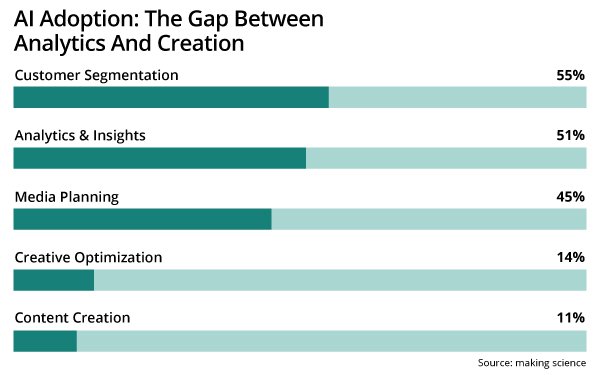
In ad technology today, the term
generative AI (for generative artificial intelligence) is inescapable — a testament to its immense potential across the advertising industry.
It promises to completely transform the
advertising industry, but not all CMOs are prepared for the change, although early iterations of AI have been present for decades throughout the industry.
Early applications were largely
focused on data analysis and customer segmentation, and then it crept into media planning.
Today, 55% of CMOs use AI for segmentation, while 51% use it for analytics and 45% use it for media
planning, according to a report from Making Science, based on a Forrester Consulting Survey of 269 CMOs with more than $50 million in ad spend.
The industries covered in the report -- AI
Reshaping Marketing: CMOs Choose Unity over Chaos -- include retail, travel, automotive, insurance, banking and finance, healthcare, energy and electronics. The custom survey was conducted in August
2025.
advertisement
advertisement
The report highlights CMOs’ views on AI. Many feel they are stuck in generative AI pilots. Although they see results, they find it difficult to implement and scale projects.
It was not surprising for Jason Downie, global CRO of Making Science RAISING, to see through the data companies using AI for analytics and insights, customer segmentation, and predictive AI,
generative and agentic. However, Downie said, he was "surprised to see the adoption of AI for creative and content, which is generative AI, is still very low. Adoption is very far behind.”
Downie has spent years supporting technology across advertising, with experience Google and Lotame, as well as creating his own companies as an entrepreneur.
Making Science offers an
interesting product known as “ad-machina,” an AI-powered technology that generates, activates, measures, and optimizes advertising campaigns by automating the creation of custom ad
creative such as text, images, and videos.
The platform integrates business data in real-time to dynamically adapt ads to user behavior and business criteria across platforms such as
Google and Meta Platforms.
Ad-machina was integrated into Google Performance Max (PMax) campaigns in May 2024, and Meta’s Facebook and Instagram in November 2024.
In June 2025,
it introduced "Creative Hub," a major upgrade using agentic AI to automate and optimize visual creative assets.
When asked to name the one thing that brands do not understand about
generative AI, Downie said “we’re just beginning. I always joke that we’re not even in the baseball stadium yet, to use the analogy of a game. We’re still in the parking lot
and have not yet bought a ticket.”
Downie added that that to test and learn in a one-off framework does not get the project to scale at an enterprise level. “It’s like 'let
me try this and let me try that',” he said. “You need to build a framework. We’ve done digital business a certain way for so long, but the pace of change is so drastic.”
It is difficult for major organizations with more than $50 million in spend to make a change like this and “expect them to steer a battleship with a toothpick," he said.
All the
applications that the Making Science report explains rely on predictive and machine-learning approaches. They are systems designed to analyze data, forecast outcomes, and automate decision-making.
Uses continue to expand, yet today only 11% of CMOs use AI for content creation, and just 14% use it for creative testing and optimization.
From the numbers, it is easy to see that
analytical use cases work, but creative workflows and multichannel strategies are missing pieces.
Despite the need to scrutinize budgets, investments have accelerated, with 66% of CMOs saying
they are likely to invest in AI-powered marketing platforms within the next twelve months.
CMOs are not chasing the shiny object. About 38% of them focus on generative AI as a priority to
achieve a return on investment (ROI), while 38% say they invest in it to deliver personalization and 42% gain deeper customer insights.
Creative acceleration and workflow automation also
matter, but they are secondary to the financial impact. In other words, AI is already accelerating marketing performance.
The critical challenge remains integration, with 76% of CMOs citing
this as a barrier. Without a better integration strategy, pilots will continue to outpace the ability to scale enterprise-level programs.
“We’re just now experimenting with agentic
AI -- and some advanced things, where you point one AI to another AI and they make it work -- will accelerate,” he asked. “At the heart of it, where does the customer live and where are
they going?”
They are searching for those "advanced" things via multimodal and on multiple platforms. CMOs are attempting to balance many agencies, partners and channels, because
that’s where consumers go.
“Folks are on ChatGPT, AI Mode, and Reddit,” he said. “The advanced potential of agentic AI will tie together all the channels and modes of
search, whether it’s Google Lens or Circle to Search or Typing or taking a photo and have it search to support consumers.”